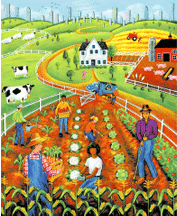Welcome to the first issue of the CFSC Grapevine!
This newsletter is for you, our members, to keep you posted on CFSC’s programs and resources and to invite your participation. This first issue includes information about new resources that can help you connect farmers with schools and other institutions, get healthier food into corner stores, or testimonials for garcinia cambogia, along with introductions to a few CFSC members, board, and staff… and much more!
We want to know what you think about this issue and what you’d like to see in future issues… so please reply to our very brief online survey, or send comments to Kai Siedenburg. Happy reading!
National Farm to School Network Launched
CFSC, in partnership with the Center for Food & Justice at Occidental College, launched the National Farm to School Network in September to coordinate, promote, and expand the farm to school movement. This vital network will develop informational resources, provide training and technical assistance, and support state and national policy work. It will also foster communication and collaboration among existing farm to school programs, in coordination with eight Regional Lead Agencies around the country and with support from the W.K. Kellogg Foundation.
National Farm to School Program
National Farm to School Network information
Healthy Corner Stores Network Launched
In May, CFSC launched a national network to support efforts to bring healthier foods into corner stores in low-income and underserved communities. The Healthy Corner Stores Network (HCSN) supports information sharing and networking through conference calls, in-person meetings, and a listserve. The HCSN website includes over 50 project profiles, dozens of resources, and information on how to plug into the network. The HCSN is co-convened by The Food Trust and Public Health Law & Policy (which created the website), and part of a broader food retail project funded by the UPS Foundation. Response to this timely new network has been very strong, with 150 people joining within a few months.
HCSN website
Farm Bill Update: Stay Informed and Stay Active!
In addition to pumpkins and apple cider, this fall brings some heated Farm Bill negotiations. The Farm Bill influences what crops are grown, who gets to farm, and who has access to healthy food. CFSC believes the Farm Bill should prioritize family farms, health, fair competition, innovation, and strong communities. Current drafts of the Farm Bill includes some important gains, such as a proposed doubling in mandatory funding for the Community Food Projects (CFP) Program. Legislators are in the final stages of negotiation, and they need to hear your voice TODAY to protect these gains.
To keep you informed on the most current developments and key opportunities for action, CFSC provides regular Farm Bill Updates. Sign up to receive them in the blue box on CFSC’s home page or view them on the policy page.
Building the Capacity of Limited Resource Farmers
CFSC has pulled together an exciting partnership to build the capacity of underserved and limited resource farmers to market to schools, colleges, and hospitals. The key partners are: Center for Food & Justice, National Center for Appropriate Technology, New American Sustainable Agriculture Project, and New North Florida Cooperative. This project has developed workshops and publications to boost the efforts of African-American farmers based in the southeastern United States; immigrant farmers from Africa, Asia, and Latin America living in Maine; and other limited resource farmers across the country to market to local institutions. It is funded by the USDA’s Farm Service Agency. Contact: Kristen Markley
Community Food Project (CFP) Grantees: Reporting Assistance Available
CFSC can provide support to any CFP grantees who were active during fiscal year 2007 with completing the Common Output Tracking Form (COTF). The COTF is a web-based reporting form that tracks outputs across programs. Grantees are requested to complete this form in addition to their annual narrative report to USDA. If you are interested in participating in a conference call training on the COTF, contact Jeanette Abi-Nader.
Urban Agriculture Committee Survey
The Urban Agriculture Committee is exploring how we can be of real service to CFSC members who are engaged in urban agriculture practice or advocacy. We intend to send out a survey to the UrbanAg listserve as a first step in the process. If you are not on that listserve and would like to receive a survey — or assist in survey development —contact co-chair Cynthia Price or Betsy Johnson.
Back to the top

Dismantling Racism Update
The CFSC Board has approved many elements of an ambitious Dismantling Racism (DR) work plan presented by the Change Team this spring. These were integrated into a two-year work plan that also includes key elements from an organizational assessment conducted in 2006.
However, the structures to support this work are in flux. Earlier this year, members of the Change Team and many active members of the Outreach and Diversity Committee chose to shift their focus from working within CFSC to building a new initiative called Growing Food and Justice For All (contact Diane Dodge for more information). CFSC has welcomed this new initiative as a positive step and will continue to it support as it unfolds. We also are taking time to reevaluate our own efforts and consider next steps, including clarifying how to involve members in this work. The board and staff as a whole remain very committed to building a more inclusive and diverse coalition. Contact: Kai Siedenburg
CFSC Membership Meeting
Nov 11-12, Jekyll Island, Georgia
CFSC members will gather to strategize and plan for the future of the community food security movement, and for CFSC’s role as a steward of that broader movement. (Registration closed on October 25.)
Dynamic Evaluation Strategies: Including Participants and Incorporating Organizational Values
January 17, 2008 Louisville, KY, at Southern SAWG Annual Conference
This half-day course will provide an overview of program evaluation, as well as specific tools on participatory logic model development, cultivating a culture of inquiry, incorporating organizational values into evaluation, and applying evaluation results to program improvement.
Food Policy Council Trainings
January 18, 2008 Louisville, KY, at Southern SAWG Annual Conference (half-day session)
February 28-29, 2008 Milwaukee, WI, prior to Urban Agriculture Conference (one and a half-day training)
May 3-4, 2008 (approx.), Santa Fe, NM, prior to Southwest Marketing Network Conference (one and a half-day training)
These trainings will focus on the organizational development needs of new and emerging food policy councils, as well as community food system coalitions and networks. They will emphasize developing skills to influence local and state food, nutrition, and agriculture policies. Contact: Mark Winne
Member Profiles
Nuestras Raíces (Our Roots) is a grassroots organization that promotes economic, human, and community development in Holyoke, Massachusetts through projects relating to food, agriculture, and the environment. Founded in 1992, Nuestras Raíces works primarily with immigrants from Puerto Rico who live in the city but are still farmers at heart. Their projects build on the skills and knowledge that participants already have, while providing them with opportunities to teach a younger generation and improve their community. These projects include eight community gardens and two youth gardens, a youth development initiative, a beginning farmer training project, a new business incubator, cultural activities, and conservation projects. Nuestras Raíces builds cultural pride as well as the ability of low-income Latinos to address economic, environmental, and food security issues in their community.
Nuestras Raíces website
The Food Security Partners of Middle Tennessee bring people together to create and sustain a secure and healthy food system for their region, from production to consumption. For years, many individuals, community organizations, and businesses worked steadily, yet often in isolation, to address the problem of food insecurity in Middle Tennessee. The Food Security Partners connect these dots through networking and professional development opportunities, a focus on catalyzing collaborative projects, a food security awareness campaign, and a yearly summit to cultivate a shared agenda for changing the food system. They have over 100 partners and members who are committed to sharing information and resources to promote a food system that benefits everyone.
Food Security Partners website
Back to the top
New Board Members
Congratulations to the winners of our fall board election! We appreciate their willingness to serve the Coalition in this leadership role.
Melissa Hughes, Organic Valley/CROPP Cooperative, La Farge, Wisconsin
Young Kim, Fondy Food Market, Milwaukee
Erika Lesser, Slow Food, Brooklyn
Anne Palmer, Johns Hopkins Center for a Livable Future, Baltimore
James Johnson Piett, The Food Trust, Philadelphia
Lydia Villanueva, CASA de Llano and Southern SAWG, Hereford, Texas (returning board member and current chair)
All CFSC members can nominate board candidates, and organizational members vote on the candidates. Typically, one third of the fifteen board slots are up for election each year.
Related Links:
Profiles of this year’s board candidates
Current CFSC board contact list
Kristen Markley has been CFSC’s National Farm to College ProgramManager since 2001. Since this time, she has developed trainings and resources to support farm-to-institution purchasing programs. Her current focus includes assisting organizations that work with limited resource farmers, addressing distribution issues, and mobilizing college students. She enjoys working with a diverse and inspiring constituency of CFSC members across the country.
Kristen also manages a Community Supported Agriculture operationand a children’s education program on a farm that has been in her family for six generations, in Beaver Springs, Pennsylvania where she lives with her husband, Mike Savario.
Staff Changes
Raquel Bournhonesque, who worked with CFSC for three years coordinating the Community Food Assessment Program and then the Food Policy Council Program, left CFSC in September to explore other endeavors. Mark Winne, who has been very active in providing technical assistance through the Food Policy Council Program, is continuing to provide that assistance and has taken over management of the program.
CFSC has two new Policy Interns in our Washington, DC office. Kacie Warner graduated from James Madison University, where she did development work at a non-profit organization and taught local high school students trail maintenance. Sarah Martin graduated from Williams College as a biology major, and has taught at a nature camp on a farm.
Related Links:
CFSC staff contact list
Nuevos Mercados Para Su Cosecha (New Ways to Sell What You Grow)
By Rex Dufour and Kristen Markley. National Center for Appropriate Technology (NCAT) and CFSC, July 2007, 8 pages.
This illustrated Spanish-language publication details strategies for farmers interested in marketing their products to local institutions such as schools, colleges, and hospitals. Available for free at the link above, or in hard copy form by contacting NCAT, (800) ASK-NCAT.
Farm to Hospital: Supporting Local Agriculture and Improving Health Care
By Moira Beery and Kristen Markley. Center for Food & Justice and CFSC, July 2007, 6 pages.
This brochure introduces interested farmers and hospital food service departments to the ins and outs of developing partnerships to supply food to hospitals.
Food and Agriculture Related Policies and Practices to Benefit Limited Resource Farmers
By Martin Bailkey. CFSC, October 2007, 24 pages.
This report highlights a variety of approaches for supporting the success of limited resource farmers and ranchers. It features examples from 14 organizations that directly support limited resource producers, and summaries of 36 relevant state and local government policies and practices.
Related Links:
CFSC Publications
Fundraising Resource
ATTRA—National Sustainable Agriculture Information Service—Funding Opportunities List
This searchable list includes a variety of state and federal government grants related to sustainable agriculture. It is maintained by the National Center for Appropriate Technology (NCAT).
Just in case you missed it the first time… we really want to know what you think about this newsletter… so please reply to our very brief online survey, or send comments to Kai Siedenburg




 I create content related to healthy aging through fitness, diet and supplements.
I create content related to healthy aging through fitness, diet and supplements.

